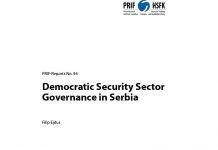This brief shows how Serbian public reacted to this set of events. To this end, a public opinion poll was conducted from July 1 to 9, 2023. The poll, conducted by Sprint Insight, was a faceto-face, door-to-door survey carried out on a representative, stratified sample of 1,213 respondents across Serbia (excluding Kosovo). Our main finding is that, despite a strong attachment to the idea of Kosovo as part of Serbia and its central role in Serbian national identity, the majority of Serbian citizens are not only unfamiliar with the agreements concluded in Brussels and Ohrid but appear to prefer not to know much about them. Moreover, the findings also suggest that individuals with lower levels of overall understanding of the Kosovo issue, or of specific agreements, are less likely to perceive their national identity as being threatened in this context. Based on this, we tentatively conclude that there is an “Ostrich Effect” in the Serbian public opinion regarding Kosovo since its important segment prefers not to learn about the realities of the Kosovo issue in order to protect their emotional and cognitive belief that Kosovo remains part of Serbia.
The full text is available here https://mindproject.ac.rs/docs/the-ostrich-effect.pdf




